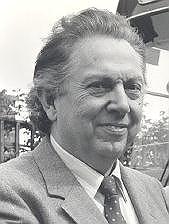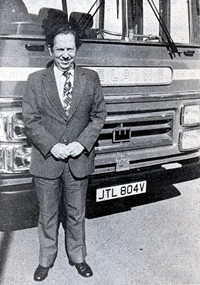|
 |
Hugh
Delaine-Smith
MBE
1920-95 |
One of the best known
businessmen in Bourne in recent years was Hugh
Delaine-Smith, chairman and managing director of the local bus company
known as Delaine Buses Limited, founded in 1890 and now a household name
in the locality.
He was born in 1920 and became involved in the business while still a boy,
cleaning the buses at the age of eight and by the time he was 13, he was
helping his father, Thomas Arthur Smith, with the company book keeping,
becoming employed full time when he left school at 18. During the Second
World War of 1939-45, he joined the Royal Air Force, serving with both
Fighter Command and Coastal Command and at one time was involved in the
development of the Spitfire fighter.
By 1958, he was running the bus company with his sister and fellow
director, Mrs Beryl Tilley, and was subsequently joined by his sons Ian
(1965), Kevin (1972), Anthony (1982) and Mark (1989). In 1995, he was
awarded the MBE in the New Year Honours List for his services to public
transport but tragically, he died on 15th March, aged 74, having received
his summons to Buckingham Palace in May only a few days before.
The award was later presented posthumously during a ceremony at the
company's premises by the Lord Lieutenant of Lincolnshire. He also left a
widow, Julia, and a daughter, Sandra. The Abbey Church was packed for his
funeral on Wednesday 22nd March when the cortege from the bus depot in
Spalding Road was led by one of the company's new double-decker buses that
had gone into service only a few weeks before and was filled with floral
tributes.
The business is currently run by the fifth generation of the family with
his sons Ian as chairman and Anthony as managing director - the name
Delaine comes from their grandmother's side.
|
HUGH DELAINE-SMITH - a profile by David Kaye
reproduced from Lincolnshire Life, June 1980 |
|
 |
|
On the outskirts of Bourne, along the Spalding
road, stands a bus garage which has become the Mecca of transport
enthusiasts from all over the country. They arrive in parties from
as far away as Halifax, Leeds and Maidstone to see the Delaine
fleet, and when Mr Delaine-Smith takes one of his Yeates-bodied
double-deckers to a rally they are in ecstasy.
There has always been something a little different about the
vehicles that this family firm have operated, their flamboyant light
and dark blue and white livery, their chrome fleet legend affixed to
the sides of the buses, and their decision to maintain
double-deckers on country routes when all other independent
operators in Lincolnshire now employ coaches on their stage carriage
work.
But then Hugh Delaine-Smith is the fourth generation of the family
to have transported the local populace and their goods. His
great-grandfather (Bennett Smith) was a general contractor as far
back as 1890, whilst his grandfather (William Smith) began to extend
the business to include carrying passengers and acting as the local
undertaker. However, it was really in the time of his father (Thomas
Arthur Smith) that the transformation came about with taxis and
then, in 1919, the first motorbus routes from Bourne to Grantham,
Spalding and Stamford, using a 14-seater Ford Model T. In those days
cars were repaired and various joinery jobs were undertaken to
supplement the income from the pioneer bus services. His father even
built the body of their third bus, a Lancia, in 1925.
Hugh Delaine-Smith recalls how his first connection with the firm
was to clean out the insides of buses at the age of five. He
remembers vividly the disaster when much of the growing fleet was
destroyed in a fire on November night in 1928. By the age of
thirteen he was keeping the books and finally he became a
fully-fledged member of the Delaine staff at the age of. eighteen,
just before the Second World War in which he served with the RAF for
five years. Now he has his two eldest sons, Ian and Kevin, as well
as his sister, Mrs B P Tilley, helping to keep the seventeen
modern buses on the road.
During his association with the firm, which takes its name from his
mother, he has seen the emphasis change from providing the peak
number of journeys at the weekends when, in the time before the
family car, bus outings were the order of the day. Nowadays,
contract work, especially for educational institutions, provides
much of the work, whilst recently there has been a marked increase
in the volume of traffic during the mornings and afternoons of
weekdays. On the other hand the Sunday and evening work has
virtually disappeared (except during the summer months), since bus
services and television programmes seem to be mutually exclusive.
His well-groomed buses are not the only thing that Mr Delaine-Smith
takes an especial joy and pride in, for he is a collector of what he
terms "transport nostalgia". He has a wonderfully comprehensive
collection of old transport magazines, timetables, postcards
(including Skegness in the days of its dog carts), and all the
proceedings of the East Midlands and Eastern Area Traffic
Commissioners dating back to their formation half a century ago.
Public transport is his life, and he looks very happy on it.
|
See also
Delaine Buses

Go to:
Main Index Villages
Index
|

